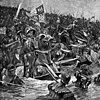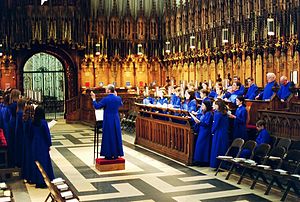The Yorkshire Portal
Yorkshire (/ˈjɔːrkʃər, -ʃɪər/ YORK-shər, -sheer) is an area of Northern England which was historically a county. Despite no longer being used for administration, Yorkshire retains a strong regional identity. The county was named after its original county town, the city of York.
The south-west of Yorkshire is densely populated, and includes the cities of Leeds, Sheffield, Bradford, and Wakefield. The north and east of the county are more sparsely populated, however the north east includes the southern part of the Teesside conurbation, and the port city of Kingston upon Hull is located in the south-east. York is located near the centre of the county. Yorkshire has a coastline to the North Sea to the east. The North York Moors occupy the north east of the county, and the centre contains the Vale of Mowbray in the north and the Vale of York in the south. The west contains part of the Pennines, which form the Yorkshire Dales in the north-west. (Full article...)
Selected article

The Battle of Towton was the "largest and bloodiest battle ever fought on English soil". The engagement took place near the village of the same name in Yorkshire on 29 March 1461, a Palm Sunday. It was part of the series of civil wars—the Wars of the Roses—fought between the Houses of Lancaster and York. More than 50,000 soldiers were mustered for this battle. The reigning king of England, Henry VI, headed the Lancastrians, while the Yorkists were led by Edward IV, who had declared himself king and was using this battle to affirm his claim. Their armies met on a plateau near Towton amidst a snowstorm. The Lancastrians, superior in numbers, were lured out of their defensive positions by the Yorkist archers, who took advantage of the strong wind to outrange their counterparts and inflict casualties without suffering any in return. The ensuing melee raged for hours, and the Yorkists finally gained victory after the arrival of their reinforcements. Many Lancastrians were killed in their panicked flight from the battlefield, and the heralds reported a count of 28,000 dead. Henry fled to Scotland, leaving Edward free to start the Yorkist dynasty. (more...)
Selected image
Selected biography
Gerard (died 21 May 1108) was Archbishop of York between 1100 and 1108 and Lord Chancellor of England from 1085 until 1092. A Norman, he was a member of the cathedral clergy at Rouen before becoming a royal clerk under King William I of England and subsequently his son King William II Rufus. Gerard was appointed Lord Chancellor by William I, and he continued in that office under Rufus, who rewarded him with the Bishopric of Hereford in 1096. Gerard may have been with the king's hunting party when William II was killed, as he is known to have witnessed the first charter issued by the new king, Henry I of England, within days of William's death.
Soon after Henry's coronation Gerard was appointed to the recently vacant see of York, and became embroiled in the long-running dispute between York and the see of Canterbury concerning which archbishopric had primacy over England. Gerard managed to secure papal recognition of York's claim to jurisdiction over the church in Scotland, but he was forced to agree to a compromise with his counterpart at Canterbury, Anselm, over Canterbury's claims to authority over York, although it was not binding on his successors. In the Investiture Controversy between the king and the papacy over the right to appoint bishops, Gerard worked on reconciling the claims of the two parties; the controversy was finally resolved in 1107.
Gerard was a patron of learning, to the extent that he urged at least one of his clergy to study Hebrew, a language not commonly studied at that time. He himself was a student of astrology, which led to suggestions that he was a magician and a sorcerer. Partly because of such rumours, and his unpopular attempts to reform his cathedral clergy, Gerard was denied a burial inside York Minster after his sudden death in 1108. His successor as archbishop subsequently had Gerard's remains moved into the cathedral church from their initial resting place beside the cathedral porch. (read more . . . )
Selected list -

Hull City Association Football Club, an English association football club based in Kingston upon Hull, East Riding of Yorkshire, was founded in 1904. The team's first competitive matches came in the FA Cup, being beaten 4–1 by Stockton in a replay following a 3–3 draw, before they were elected to the Football League Second Division ahead of the 1905–06 season. Hull missed out on promotion in the 1909–10 season, having an inferior goal average to Oldham Athletic and finishing in third. The 1929–30 season saw Hull relegated to the Third Division North after 21 seasons in the Second Division while reaching the semi-final of the FA Cup, where they were beaten by Arsenal after a replay. Promotion back to the Second Division was achieved three years later, with the Third Division North championship becoming the club's first major honour. However, they were relegated in the 1935–36 season and it was 13 years before another return to the Second Division was made, when, under the player-management of former England international Raich Carter, the Third Division North title was won. Relegation back to this division came in the 1955–56 season and following League reorganisation implemented for the 1958–59 season Hull won promotion in the Third Division's inaugural season, although they were relegated after one year.
The Third Division championship was won in the 1965–66 season and Hull remained in the Second Division for 12 years before relegation in 1978. Hull reached the semi-final of the Watney Cup in the tournament's inaugural staging in 1970, where they were beaten by Manchester United in a penalty shoot-out; this was the first game in English football to be decided by this method. The Final of this competition was reached in 1974, where Hull were beaten by Stoke City. Relegation to the Fourth Division for the first time in the club's history came in 1981 and a return to the Third Division was secured two years later in the 1982–83 season. The season after, Hull reached the final of the Associate Members' Cup in its inaugural season and were beaten by AFC Bournemouth. Promotion to the Second Division came the following season, although relegations in the 1990–91 and 1995–96 seasons saw the club return to the fourth tier.Hull's first play-off campaign ended unsuccessfully, being beaten by Leyton Orient in the semi-final in the 2000–01 season. However, successive promotions in the 2003–04 and 2004–05 seasons saw Hull rise from the fourth tier to the second tier in a space of two years. After 104 years of existence, Hull were promoted to the Premier League for the first time in their history, beating Watford in the play-off semi-finals and Bristol City in the 2008 Football League Championship play-off final. Hull's first Premier League season saw safety from relegation ensured on the last day of the season, although the club was relegated the following season after finishing 19th in the league. Three years later, Hull returned to the Premier League after finishing the 2012–13 season as Championship runners-up. In the 2013–14 season they achieved their highest ever league finish of 16th and were runners-up to Arsenal in their first ever FA Cup Final appearance. Since then, they have been relegated to the Championship and promoted again. (Full article...)Selected Did You Know . . .

- ... that Jimmy Speirs (pictured) won the Military Medal while serving with the Queen's Own Cameron Highlanders, six years after his goal helped Bradford City win the 1911 FA Cup Final?
- ...that Lancelot Blackburne was thought to have spent time in the Caribbean as a buccaneer as a young man, and lived openly with his mistress whilst Archbishop of York?
- ... that the lifting of the Siege of Hull in 1643 was marked by an annual public holiday in Hull, England, until the Restoration?
- ... that an extension of Ferrybridge Henge in West Yorkshire was discovered when surveying an area in preparation to erect a row of houses?
General images -
Subcategories
Selected panorama

Topics
Related portals
WikiProjects
Things you can do
Associated Wikimedia
The following Wikimedia Foundation sister projects provide more on this subject:
-
Commons
Free media repository -
Wikibooks
Free textbooks and manuals -
Wikidata
Free knowledge base -
Wikinews
Free-content news -
Wikiquote
Collection of quotations -
Wikisource
Free-content library -
Wikiversity
Free learning tools -
Wikivoyage
Free travel guide -
Wiktionary
Dictionary and thesaurus



















































